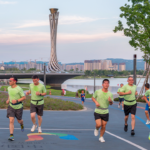Cambodian King Norodom Sihamoni on Monday appointed Hun Manet as the new prime minister, succeeding his father, who is stepping down after a long term rule. Chinese experts said friendship and trust between China and Cambodia is expected to further solidify under the leadership of the new Cambodian government in the coming period.
The monarch signed a royal decree to designate Hun Manet, 45, as the new prime minister for a five-year-term following a request from former leader Hun Sen. “The designated prime minister of the Kingdom of Cambodia has duties to prepare the members of the government in order to ask for the adoption of confidence from the National Assembly,” Sihamoni said in the royal decree.
Hun Manet, along with his new cabinet members, will need to win a vote of confidence in the National Assembly slated for August 22 in order to officially become the new prime minister, and he is expected to be sworn in on the same day, the Xinhua News Agency reported.
The Hun Manet government is expected to be consistent in its friendly attitude toward China and further deepen Cambodian ties with China, based on the Belt and Road Initiative and a diamond cooperation framework with six priority areas, Gu Jiayun, director of Center for Cambodia Studies of Beijing Foreign Studies University, told the Global Times on Monday.
The stability of bilateral relations lies in the profound friendship and political foundation established over the years between the leaders of the two countries, which will not be easily altered because of the leadership change, Gu noted.
Not only do the two governments support each other’s core concerns and have always been fully willing to build a China-Cambodia community of a shared future, China-Cambodia economic and trade cooperation has been on the rise, with its depth and breadth to rapidly expand and deepen following the implementation of the China-Cambodia Free Trade Agreement (CCFTA) and the Regional Comprehensive Economic Partnership (RCEP), Gu said.
With the completion and commencement of several Chinese aid projects in Cambodia, China-Cambodia relations will grow on a brighter path, Gu added.
Other Chinese analysts pointed out that the close ties between China and Cambodia are rooted in their highly aligned national interests, where maintaining a friendly relationship serves both sides’ common interests.
China has made substantial investments in Cambodia, playing a significant role in the country’s infrastructure development, industries and exports and in developing the national economy and improving the livelihoods of the Cambodian people, Xu Liping, director of the Center for Southeast Asian Studies at the Beijing-based Chinese Academy of Social Sciences, told the Global Times on Monday.
The appointment came after the ruling Cambodian People’s Party (CPP) of Hun Sen won a landslide victory in the July 23 general election, gaining 120 out of 125 seats in the National Assembly. Hun Sen, 71, said he will remain the CPP’s president and will take the position of President of the Senate in a Senate Election on February 25 next year, according to Xinhua.
Some have speculated whether Hun Manet – who attended US military academy West Point and received higher education in the West – might adopt subtle innovation in the country’s foreign policy in order to maximize its national interests.
The policy direction of Cambodia’s new leadership will not undergo major adjustments but is expected to see subtle innovation along its policy continuity, Gu noted.
(Global Times)




